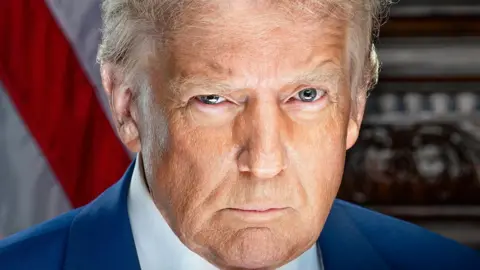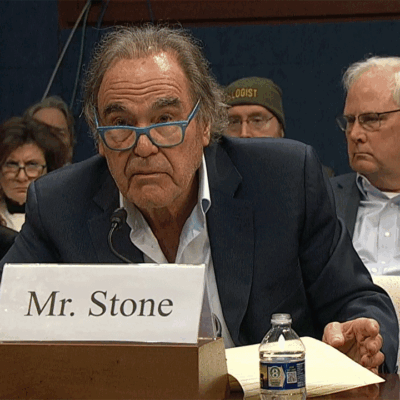
 EPA
EPA
Donald Trump has said he is “not joking” about wanting to serve a third term as US president.
The US Constitution says that “no person… shall be elected more than twice”, but some Trump supporters have suggested there could be ways around that.
Why is Trump talking about a third term?
Trump was asked in an interview with NBC about the possibility of seeking a third term and said “there are methods which you could do it”.
“I’m not joking… a lot of people want me to do it,” he added. “But, I basically tell them we have a long way to go, you know, it’s very early in the administration.”
Trump, who would be 82 at the end of his second term, was asked whether he would want to keep serving in “the toughest job in the country”.
“Well, I like working,” he replied.
These were not his first comments on the topic. In January, he told supporters that it would be “the greatest honour of my life to serve not once, but twice or three times or four times”. However, he then said this was a joke for the “fake news media”.
What does the US Constitution say?
On the face of it, the US Constitution seems to rule out anyone having a third term. The 22nd Amendment states:
“No person shall be elected to the office of the president more than twice, and no person who has held the office of president, or acted as president, for more than two years of a term to which some other person was elected president shall be elected to the office of the president more than once.”
Changing the constitution would require a two-thirds approval from both the Senate and the House of Representatives, as well as approval from three-quarters of the country’s state-level governments.
Trump’s Republican Party controls both chambers of Congress but does not have the majorities needed. Additionally, the Democratic Party controls 18 of the 50 state legislatures.
How could Trump be president for a third term?
Trump supporters say there is a loophole in the constitution, untested in court.
They argue that the 22nd Amendment only explicitly bans someone being “elected” to more than two presidential terms – and says nothing of “succession”.
Under this theory, Trump could be the vice-presidential running-mate to another candidate – perhaps his own vice-president, JD Vance – in the 2028 election.
If they win, the candidate could be sworn into the White House and then immediately resign – letting Trump take over by succession.
Steve Bannon, the podcaster and prominent former Trump adviser, said he believed Trump would “run and win again”, adding there were “a couple of alternatives” in determining how.
Andy Ogles, a Tennessee Republican in the House of Representatives, introduced a resolution in January calling for a constitutional amendment to allow a president to serve up to three terms – as long as they were not consecutive.
This would mean that only Trump of all former surviving presidents would be eligible – Barack Obama, Bill Clinton and George W Bush all served consecutive terms, whereas Trump won in 2016, lost in 2020, and won again in 2024.
However, the high bar for constitutional amendments makes Ogles’ proposal a pipe dream – although it got people talking.
Who opposes a Trump third term?
Democrats have deep objections.
“This is yet another escalation in his clear effort to take over the government and dismantle our democracy,” said Daniel Goldman, a New York Representative who served as lead counsel for Trump’s first impeachment.
“If Congressional Republicans believe in the Constitution, they will go on the record opposing Trump’s ambitions for a third term.”
Some within Trump’s party also think it’s a bad idea.
The Republican Senator Markwayne Mullin, of Oklahoma, said in February he would not back an attempt to put Trump back in the White House.
“I’m not changing the constitution, first of all, unless the American people chose to do that,” Mullin told NBC.
What do legal experts say?
Derek Muller, an election law professor at the University of Notre Dame, said the Constitution’s 12th Amendment says “no person constitutionally ineligible to the office of president shall be eligible to that of vice-president of the United States”.
That means serving two terms in office disqualifies anyone from running as a vice-presidential candidate, in his view.
“I don’t think there’s any ‘one weird trick’ to getting around presidential term limits,” he said.
Jeremy Paul, a constitutional law professor at Boston’s Northeastern University, told CBS New there were “no credible legal arguments” for a third term.
Has anyone served more than two terms?

 Getty Images
Getty Images
Franklin Delano Roosevelt was elected four times. He died three months into his fourth term, in April 1945.
The Great Depression and the Second World War coloured Roosevelt’s time in office – and are often cited for his extended presidency.
At that time, the two-term limit on US presidents had not been written into law – it was instead a custom followed since George Washington refused a third term in 1796.
Roosevelt’s extended stewardship led to the tradition being codified into law in the 22nd Amendment in 1951.





